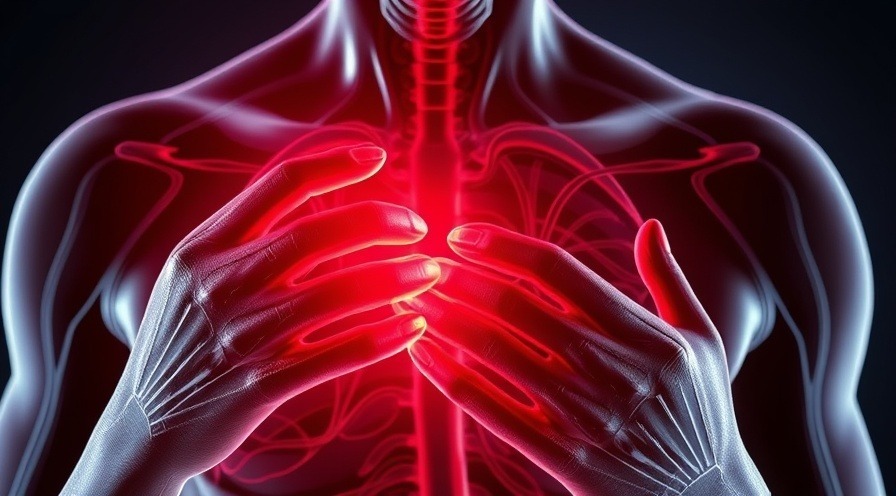Have you ever ignored subtle aches, brushing them off as stress? Those quiet signals could be your heart's desperate cry for helpHeart disease is often called the silent killer, not because it arrives without a trace, but because its warning signs can be easy to ignore. Many symptoms masquerade as everyday stress, fatigue, or minor discomfort. Yet, detecting these early warning signs of heart disease before they escalate can be life-saving.In this guide, you’ll discover how to recognize those hidden clues, understand your unique risk factors, and know precisely when you should seek medical attention. Whether for yourself or for someone you care about, knowledge and timely action are your best defenses against heart attacks and lasting heart problems.Understanding Early Warning Signs of Heart DiseaseThe early warning signs of heart disease are often subtle, making them easy to overlook. Symptoms like chest pain, shortness of breath, and irregular blood pressure can creep in slowly or fluctuate in intensity, sometimes mistaken for common ailments. Even minor signs, such as fatigue or occasional dizziness, may not seem urgent but can indicate that your cardiovascular health is at risk. This section demystifies those initial signals, providing clarity on what your body is truly telling you.Heart disease progresses quietly for many people, particularly in its early stages. Silent warning signs can range from mild, fleeting chest discomfort to unexplained weakness or reduced stamina. According to cardiologists, addressing these seemingly insignificant issues sooner, rather than later, leads to better outcomes and fewer complications. As you read, keep in mind that prevention and early intervention can dramatically reduce your risk of heart attacks, heart failure, and more severe cardiovascular disease.Identifying what counts as a warning sign—from chest pain to irregular blood pressure readingsUnderstanding the silent symptoms that often go unnoticedRecognizing your unique risk factors and learning who’s most vulnerableStep-by-step guide on what to do when you notice early symptomsChest pain or discomfort—even fleeting or dull achesShortness of breath during routine activities or restIrregular or high blood pressure readingsUnexplained fatigue or weaknessDizziness, nausea, or breaking out in a cold sweat“Don’t ignore subtle indicators—early detection of heart disease is vital for saving lives.” – Dr. Carter, CardiologistWhy Early Warning Signs of Heart Disease Are Often OverlookedDespite broad awareness, many early warning signs of heart disease are dismissed or misinterpreted, often blamed on stress or busy schedules. Mild chest pain, for example, can be overlooked as muscle soreness, while shortness of breath may be attributed to having a hectic day rather than a potential blockage in your blood vessels. This tendency to downplay symptoms can delay crucial diagnosis and treatment, putting individuals at higher risk for heart attack or heart failure. It’s easy to assume you’re just tired or under pressure, but knowing the difference is critical for safeguarding your health.Medical professionals often see patients who wait until symptoms intensify before seeking help. By that point, heart damage may already be progressing. That’s why understanding the overlap between stress and true cardiovascular symptoms—especially ones like chest pain and fatigue—is so important. The ability to identify authentic warning signs from daily stressors could be the deciding factor between a simple check-up and a life-altering medical event.For those interested in a deeper dive into specific risk factors, understanding the role of lipoprotein(a) in cardiovascular health can provide valuable insight. Elevated levels of this particle are increasingly recognized as a hidden contributor to heart disease—learn more about how lipoprotein(a) may influence your heart disease risk and what steps you can take if you’re concerned.Is It Just Stress or the Signs of Heart Disease?Fatigue, headaches, or general malaise: Often written off as work stress or lack of sleep but can signal poor blood flow to the heart.Palpitations: A racing or irregular heartbeat may be blamed on anxiety but could indicate an underlying heart problem.Pain in your chest or pressure: Sometimes dismissed as muscle strain or indigestion, but persistent discomfort is a classic warning sign.List: Symptoms often blamed on stress but are actually warning signsPersistent fatigueUnexplained dizzinessRecurring chest discomfortBreathlessnessSwelling in lower legs or anklesSilent Warning Signs: Chest Pain, Fatigue, and Poor Blood CirculationMany people associate heart attack with dramatic, crushing chest pain, but the reality is often much quieter. Early warning signs of heart disease can present as mild pain or vague discomfort in the chest—not sharp enough to trigger alarm, yet consistent enough to hint something’s wrong. Chronic fatigue and reduced energy levels are also common indicators. Poor blood circulation, which is sometimes dismissed as feeling cold or numb in the limbs, could mean there’s restricted blood flow to the heart or even developing vascular disease.Other silent signals that something may be off include cold sweats, nausea, or lightheadedness during light exertion. Swelling in the lower legs may suggest your heart isn’t pumping blood efficiently, causing fluid to build up. While these symptoms on their own might not seem alarming, their combination or persistence over days and weeks is often a sign of heart failure or impending heart attacks. If you’re experiencing any of these subtle but persistent issues, don’t postpone seeking a professional evaluation.Unusual, ongoing fatigue that isn’t explained by sleep or activityRecurring pressure, squeezing, or fullness in the chest—even if mildShortness of breath even when at restSwelling, especially in the ankles or lower legsLightheadedness or unexplained nauseaChest Pain and Other Early Warning Signs of Heart DiseaseWhen most people imagine a heart problem, they think of sharp chest pain and collapse. However, chest pain can appear in much subtler forms and is a critical early warning sign of heart disease. Some experience a dull ache, pressure, or fleeting discomfort that comes and goes, especially during physical exertion or periods of stress. Don’t ignore these signs—especially if the discomfort is unfamiliar or increasing in frequency.Along with chest pain, watch for supporting symptoms like dizziness, shortness of breath, nausea, or pain radiating to the jaw, back, or arm. These indicators suggest poor blood flow to the heart, often a result of narrowed blood vessels or early stages of artery disease. The sooner you identify and act on these warnings, the higher your chances of managing heart disease before it escalates into a full-blown heart attack or heart failure.Understanding Chest Pain as a Critical Warning Sign"Chest pain isn't always severe or dramatic—it can be dull, fleeting, or just feel like discomfort."Shortness of breath, even when at restSudden dizziness or lightheadednessNausea or indigestion that doesn’t improve with usual remediesTip: If chest pain is accompanied by sweating, palpitations, or fainting, call emergency services right away.Shortness of Breath: A Key Early Warning Sign of Heart DiseaseShortness of breath is more than just feeling winded—it’s a classic indicator that your heart may not be able to pump blood efficiently. Whether it comes on suddenly or gradually, persistent shortness of breath (especially during rest or light activity) is a hallmark of early warning signs of heart disease. This symptom can stem from blocked blood vessels, reduced heart function, or even early heart failure. Recognizing this seemingly ordinary symptom as a potential red flag can prompt timely treatment and prevent complications like silent heart attacks.Be aware that poor blood circulation often goes hand in hand with shortness of breath. If you find yourself stopping frequently during walks, struggling to catch your breath, or waking up at night feeling suffocated, it’s crucial to get your heart checked. Early intervention can help restore blood flow and prevent further arterial damage, especially if you have additional risk factors like high blood pressure or a family history of cardiovascular disease.Link Between Shortness of Breath and Heart DiseasePoor blood circulation: When the heart loses strength, blood doesn't move efficiently, causing muscles—especially in the legs and lower body—to tire quickly, sometimes resulting in swelling or discomfort.Heart attack risk: Shortness of breath is a common sign of developing blockages that cut off oxygenated blood to both the lungs and heart tissue, warning that a heart attack may be imminent.Blood vessel constriction: Narrow or blocked arteries force the heart to work harder, making physical activities feel more exhausting and increasing the likelihood of breathlessness or fainting spells.Silent Heart Attacks: When Early Warning Signs of Heart Disease Go UnnoticedSilent heart attacks are a grave concern, especially because their early warning signs of heart disease can be so discreet they’re missed entirely. Unlike dramatic “Hollywood-style” heart attacks, silent heart attacks often occur with mild discomfort—or sometimes, no noticeable symptoms at all. Minor chest discomfort, fatigue, indigestion, or general unwellness may be all the body offers as clues. These events still damage heart muscle and dramatically raise the risk for future, potentially fatal, heart problems. Recognizing the subtlety of these events is key to prevention and treatment.Certain individuals are more prone to silent heart attacks, particularly those with multiple risk factors such as high blood pressure, advanced age, or a strong family history of cardiovascular disease. If these risk factors overlap with persistent symptoms—no matter how minor—an immediate discussion with a healthcare provider is critical.Understanding Silent Heart Attacks and Their Risk FactorsHigh blood pressure: Constantly elevated readings signal ongoing cardiovascular strain and higher risk for silent heart attacks.Age: Risk rises significantly for men after 45 and women post-menopause.Family history: If parents or siblings have had early heart disease or heart attacks, your risk is notably increased.Table: Comparing Early Warning Signs of Heart Disease vs. Common Stress SymptomsSymptomLikely Cause (Stress or Heart Disease)Urgency to ActPersistent chest discomfortHeart DiseaseImmediate medical evaluationIncreased heart rate during stressful eventsStressMonitor; seek help if it persistsShortness of breath during restHeart DiseaseSee a healthcare provider promptlyLightheadedness after standing up quicklyStress/Orthostatic changeLow urgency unless persistentSwelling in lower legs or anklesHeart DiseaseHigh; needs doctor evaluationIntermittent headachesStressMonitor; track other symptomsRisk Factors: Who Is Most Vulnerable to Early Warning Signs of Heart Disease?Heart disease doesn’t discriminate, but some people face higher risks. Key risk factors include high blood pressure, advancing age, family history of cardiovascular disease, and unhealthy lifestyle habits. Identifying where you stand on the risk spectrum allows for earlier detection and better prevention strategies. Even if you feel healthy, being aware of your personal vulnerabilities helps you notice the early warning signs of heart disease before complications arise.Recent clinical studies confirm that individuals with diabetes, obesity, high cholesterol levels, and a sedentary lifestyle are at greater risk for heart problems. If these risk factors sound familiar, routine check-ups and monitoring are non-negotiable. Awareness not only helps you take control of your health but enables you to act swiftly if early symptoms appear, reducing the risk for heart attacks and more severe outcomes.High-Risk Groups: Blood Pressure, Age, and Family HistoryHigh blood pressure or hypertensionMen aged 45+ and women post-menopauseFamily history of heart disease or heart attacksHigh cholesterol or poor blood sugar controlObesity, inactivity, smoking, or excessive alcohol use"Awareness of personal risk factors can make all the difference in timely intervention."Taking Action: What to Do If You Notice Early Warning Signs of Heart DiseaseSpotting early warning signs of heart disease is only half the battle—knowing how to respond is just as vital. Regardless of age or background, taking your symptoms seriously and pursuing prompt medical advice can halt the progression of cardiovascular disease. If you notice warning signs, do not wait for them to intensify before seeking help. Early diagnosis and treatment greatly improve your odds of avoiding major heart attacks, heart failure, and permanent damage.By following a clear action plan—such as monitoring blood pressure, scheduling regular check-ups, and calling emergency services when needed—you safeguard your health and set a positive example for those around you. Being proactive is key: it could mean the difference between a simple lifestyle adjustment and a life-threatening event.Steps to Take If You Notice Warning SignsIf chest pain is severe, sudden, or accompanied by shortness of breath—call emergency services immediately.Monitor your blood pressure and heart rate at home; report abnormal readings to your doctor.Schedule a medical evaluation for unexplained symptoms lasting more than a few days, even if mild.Document your warning signs—when they happen and what triggers them—to share with your healthcare provider.Adopt heart-healthy habits: regular exercise, balanced diet, and no smoking.Remember: Fast action saves heart muscle and lives.People Also Ask: Early Warning Signs of Heart DiseaseWhat are the signs of an unhealthy heart?Common signs of an unhealthy heart include chest pain, fatigue, shortness of breath, palpitations, and swelling in the legs due to poor blood circulation or early heart failure.What are the 7 signs before you have a heart attack?The seven signs include chest pain, shortness of breath, nausea or vomiting, pain in the neck/jaw/back, cold sweats, fatigue, and lightheadedness.What age can heart failure start?While heart failure is more common in older adults, it can occur at any age due to congenital issues, infections, or lifestyle risk factors.What lifestyle triggers heart failure?Key triggers include poor diet, lack of exercise, smoking, excessive alcohol intake, unmanaged stress, and chronic conditions like diabetes or hypertension.FAQs on Early Warning Signs of Heart DiseaseWhat are early warning signs of heart disease most people miss? Subtle fatigue, mild chest discomfort, shortness of breath, and swelling in the lower legs are frequently overlooked signs. Other signs include dizziness and unexplained nausea.Can stress really cause heart attacks? Yes, chronic stress can increase blood pressure and heart rate, raising your risk. However, stress also masks symptoms like chest pain or exhaustion that may indicate heart disease.When should I seek emergency help for potential heart attacks? If you experience severe or sudden chest pain, shortness of breath, fainting, or symptoms radiating to your jaw or arm, call emergency services immediately.Who should get routine heart health checks? Anyone with a family history, high blood pressure, or other risk factors like diabetes or high cholesterol should see their healthcare provider regularly, even in the absence of symptoms.Key Takeaways: Recognizing Early Warning Signs of Heart DiseaseAct on any unusual chest pain, shortness of breath, or persistent fatigue without delay.Know your risk factors: blood pressure, cholesterol, age, and family history are key.Don’t ignore warning signs—seek medical help promptly to prevent silent heart attacks or worse outcomes.Keep records of your symptoms and share them with your provider for accurate diagnosis.Adopt healthy habits: exercise, balanced eating, and regular check-ups reduce risks.Summary and Next StepsEarly warning signs of heart disease are often silent but can be deadly if overlooked. Pay attention to your body's signals, act promptly, and seek professional guidance.Find more quality content at: NCWellnessHub.comIf you’re committed to protecting your heart health, it’s wise to look beyond symptoms and consider the broader lifestyle and environmental factors that may influence your well-being. For example, the materials you use daily in your kitchen could have a surprising impact on your cardiovascular system. To take your prevention strategy to the next level, explore how your cookware choices might affect your health and discover practical steps for a safer, heart-friendly home. Empower yourself with knowledge that goes beyond the basics—your heart will thank you for it.SourcesCDC – Heart Disease FactsAmerican Heart Association – Heart Attack Warning SignsNational Heart, Lung, and Blood Institute – Heart DiseaseMayo Clinic – Heart Disease SymptomsRecognizing the early warning signs of heart disease is crucial for timely intervention and prevention of serious complications. Symptoms such as chest discomfort, shortness of breath, unexplained fatigue, and swelling in the legs or ankles can often be mistaken for less serious conditions. However, these signs may indicate underlying heart issues that require medical attention.For a comprehensive understanding of these symptoms and their implications, the Mayo Clinic’s article, “Heart disease - Symptoms and causes,” provides detailed information on various heart disease symptoms, their causes, and when to seek medical help. Also, MedlinePlus offers a valuable resource titled “Warning signs and symptoms of heart disease,” which outlines common warning signs and emphasizes the importance of early detection.If you want to do a better job safeguarding your heart health, these resources will equip you with the knowledge to recognize early symptoms and take proactive steps toward prevention.


 Add Row
Add Row  Add
Add 




Write A Comment